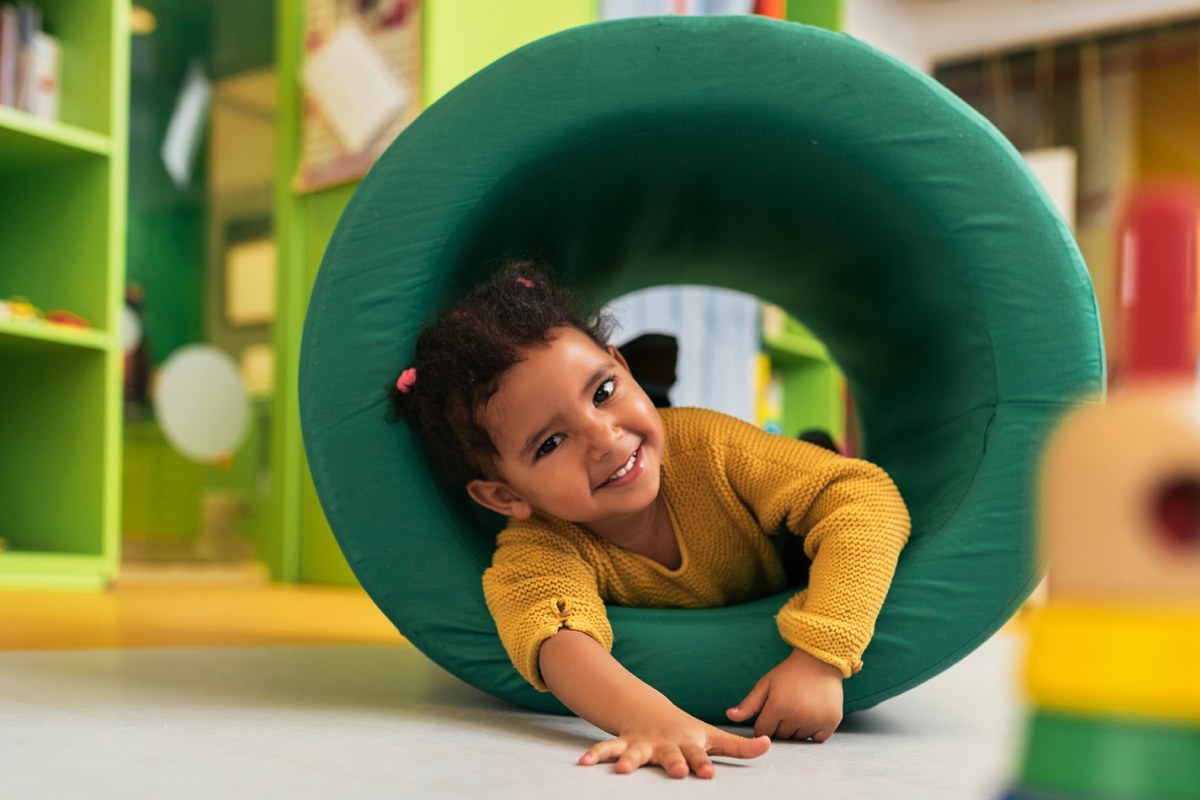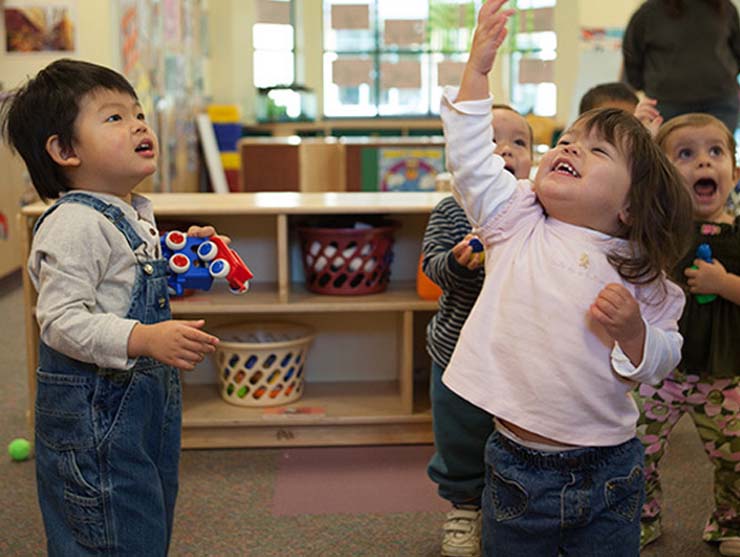What makes a daycare facility near me stand out in supporting child growth
Comprehending the Advantages of Enlisting Your Kid in a Trusted Childcare Setting
Enlisting a child in a relied on daycare setting presents different advantages that can significantly influence their very early growth. These settings offer organized knowing possibilities and advertise socializing, which are crucial during developmental years. Additionally, the presence of qualified team makes sure that kids get the care and attention they need. As parents navigate their options, comprehending just how these aspects add to a child's development ends up being essential. What elements should parents consider when looking for the best daycare?
Enhanced Discovering Opportunities
Parents frequently seek day care largely for child care, lots of programs use improved finding out opportunities that can substantially benefit a youngster's advancement. Daycare centers usually incorporate structured instructional tasks created to cultivate cognitive skills and promote very early proficiency. With interactive play, children are exposed to basic concepts such as colors, forms, and numbers, which prepared for future understanding.
In addition, many programs use thematic units that incorporate numerous topics, permitting youngsters to explore topics in a holistic way. For example, an unit on pets might consist of storytelling, crafts and arts, and exterior exploration, providing a multi-faceted discovering experience.
Qualified teachers usually lead these tasks, utilizing age-appropriate approaches to engage young minds. By taking part in these enriched instructional atmospheres, kids can create important assuming skills, creativity, and a long-lasting love of understanding. Hence, daycare can work as a valuable tipping stone in a kid's educational journey.
Socialization and Emotional Advancement
Socialization and emotional growth are important aspects of a youngster's experience in day care. Via communications with peers, kids construct crucial connections that cultivate psychological guideline and show conflict resolution skills. These fundamental experiences play a considerable function in forming their social capability and general emotional well-being.
Building Peer Relationships
Building peer partnerships is important for a youngster's socialization and psychological development in childcare settings. Engaging with other children cultivates necessary skills such as problem, interaction, and participation resolution. In these atmospheres, youngsters find out to share, take turns, and express their sensations, which enhances their capacity to link with others. Participating in group activities encourages team effort and helps kids comprehend diverse point of views, adding to empathy and understanding. Furthermore, forming relationships can give emotional support, aiding children navigate their experiences and feelings. These early connections produce a foundation for future social communications and relationships, furnishing kids with the devices required for successful involvement in both scholastic and social settings. In general, constructing peer partnerships in childcare is a crucial element of all natural development.
Psychological Guideline Skills

Psychological guideline skills are necessary for children as they browse the complexities of social communications in daycare. These skills make it possible for kids to handle their emotions in a healthy way, helping with smoother communications with caretakers and peers. In a day care setting, youngsters experience various scenarios that might evoke strong sensations, such as disappointment, unhappiness, or excitement. Learning to recognize and share these feelings appropriately is vital for their social development. Daycare environments typically give organized tasks that advertise psychological literacy, motivating youngsters to express their sensations and reply to others' emotions. By establishing psychological regulation skills, kids end up being much more experienced at forming favorable connections, enhancing their total social skills and strength, which are essential for their future communications beyond daycare.
Dispute Resolution Techniques
Navigating problems is a fundamental facet of social interactions, especially in a day care setting where youngsters often engage with their peers. In these environments, caretakers play a vital function in training problem resolution strategies that promote socializing and emotional growth. Kids learn to reveal their feelings vocally, enabling them to articulate their needs and frustrations. Caretakers motivate compromise, directing kids to discover mutually acceptable solutions. Role-playing circumstances better assist youngsters understand different point of views and the significance of compassion. By modeling respectful communication and problem-solving, caregivers outfit kids with vital abilities that prolong past day care. These methods not just boost social interactions however additionally contribute to psychological durability, preparing kids for future partnerships and challenges in various settings.
Structured Routine and Security
While numerous parents may prioritize socialization and learning when enlisting their child in day care, the importance of an organized routine and stability can not be overlooked (childcare north york). A well-organized schedule provides kids with a feeling of security, cultivating an atmosphere where they can flourish mentally and cognitively. Constant regimens help kids recognize expectations, allowing them to establish self-control and time administration abilities from a very early age
In a structured day care setup, kids get more info are introduced to predictable tasks such as meal times, play durations, and remainder routines. This predictability lessens anxiousness, allowing youngsters to feel even more comfortable and concentrated. In addition, stability in their daily regular aids in behavioral regulation, as kids learn to prepare for transitions and adjust as necessary. The mix of structure and stability not just improves children's overall development but likewise lays the groundwork for future scholastic success, making it a vital factor to consider for moms and dads looking for the most effective childcare alternatives for their children.
Qualified and Caring Staff
The top quality of personnel in a childcare setting plays a crucial function in a kid's development and well-being. Experienced teachers and caretakers give essential assistance and assistance, promoting a supporting environment. Additionally, individualized attention ensures that each youngster's special needs are satisfied, promoting a complacency and growth.
Experienced Educators and Caregivers
Selecting a daycare with skilled instructors and caregivers is important for a child's growth and health. These specialists possess the necessary certifications and training to cultivate a nurturing setting that encourages learning and development. Their understanding of youngster development concepts permits them to create interesting and age-appropriate tasks, stimulating interest and creativity in young minds. In addition, seasoned caretakers can determine and address specific needs, making sure that each youngster really feels secure and valued. Their capability to develop strong connections with youngsters promotes emotional safety, which is crucial for healthy social and psychological development. In a helpful childcare setting, children are more probable to flourish, obtaining critical skills that will certainly profit them throughout their academic trip and beyond.
Customized Attention and Support
Personalized interest and support in day care settings enhance kids's discovering experiences and psychological wellness. Qualified and caring staff play an important duty in this dynamic, as they are educated to identify each child's unique needs and learning designs. By preserving smaller team dimensions, caregivers can offer personalized support, cultivating a feeling of security and belonging. This customized strategy not only promotes cognitive growth however also urges psychological strength. Personnel typically participate in individually communications, allowing youngsters to share their feelings and thoughts honestly. Additionally, consistent communication between caretakers and parents ensures that each youngster's progression is monitored and sustained successfully. Inevitably, this individualized care cultivates a nurturing setting where kids can thrive socially, psychologically, and academically.

Safe and Nurturing Environment
Making sure a risk-free and nurturing atmosphere is vital for kids's advancement in daycare setups. A well-designed daycare center focuses on the physical safety and security of kids with secure facilities, age-appropriate equipment, and normal safety and security checks. Employee are learnt safety protocols, ensuring quick actions to any potential dangers.
Past physical security, psychological support plays an essential role. Caregivers are trained to foster a nurturing environment that motivates kids to share their sensations and develop social skills. This helpful atmosphere assists youngsters develop trust fund and confidence, essential for their psychological development.
In addition, a structured regular gives stability, allowing kids to thrive and really feel protected - childcare north york. Daily activities are developed to promote cognitive, social, and physical advancement, promoting an all-round experience. In this secure and nurturing ambience, kids are free to check out, learn, and engage, laying the foundation for future success in their academic journey
Assurance for Parents
Moms and dads can discover reassurance in recognizing that their kids are in a safe and caring setting at daycare. This comfort is critical, as it permits parents to concentrate on their job or individual duties without the continuous worry of their kid's well-being. Trusted childcare centers employ skilled personnel that prioritize kid safety and security and development, providing a structured regimen that cultivates understanding and social interaction.
In addition, numerous facilities supply real-time communication, allowing moms and dads to receive updates and pictures throughout the day, more minimizing stress and anxiety. By choosing a relied on daycare, parents can feel great that their children are not just monitored however additionally participated in purposeful activities that support their development. Ultimately, this sense of security makes it possible for moms and dads to maintain a healthier work-life balance, recognizing that their youngsters are growing in a helpful and improving setting.
Frequently Asked Questions
How Do I Choose the Right Daycare for My Kid?
To choose the appropriate day care, one need to take into consideration elements like area, team certifications, precaution, educational program, parent evaluations, and overall atmosphere. Checking out multiple facilities can also help in evaluating the suitability for the child.
What Age Is Ideal to Register My Kid in Childcare?
The optimal age to register a youngster in daycare generally ranges from six months to three years. At this stage, children gain from socializing, structured tasks, and learning chances that foster growth and independence.
Exactly How Do Daycare Costs Differ Across Different Facilities?

Childcare prices vary considerably based on location, center type, staff-to-child ratios, and included solutions. High-quality facilities generally bill more, while home-based alternatives may supply reduced rates, reflecting differing degrees of treatment and facilities offered.
Are Dishes Supplied at Day Care, and Are They Healthy?
Many childcare centers offer meals, usually concentrating on dietary equilibrium. The high quality and healthfulness of these meals can differ extensively, depending on the center's plans, sources, and dedication to kid nourishment.
What Activities Are Usually Included in a Day Care Educational program?

Day care educational programs usually consist of tasks such as crafts and arts, motion, songs and narration, exterior play, fundamental academics, and social interaction, all developed to advertise cognitive, physical, and emotional advancement in kids.
Socializing and emotional advancement are critical elements of a kid's experience in day care. Structure peer relationships is vital for a youngster's socialization and psychological growth in day care setups. Daycare settings frequently provide structured tasks that promote emotional literacy, encouraging youngsters to express their sensations and respond to others' feelings. The top quality of team in a day care setting plays a critical role in a youngster's development and well-being. Making sure a nurturing and secure environment is essential for kids's growth in childcare setups.